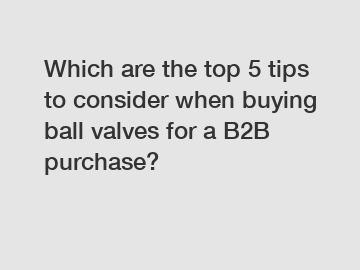Which are the top 5 tips to consider when buying ball valves for a B2B purchase?
Which Are the Top 5 Tips to Consider When Buying Ball Valves for a B2B Purchase?
Ball valves are essential components in many industrial applications, providing reliable control and shut-off functions. However, with so many options available, choosing the right ball valve for a B2B purchase can be a challenging task. To make an informed decision, it is crucial to consider several key factors. In this article, we will explore the top five tips that should be taken into account when buying ball valves for a B2B purchase.
1. Determine the Valve's Material and Construction:

The material and construction of a ball valve play a crucial role in its performance and durability. Different materials, such as brass, stainless steel, or PVC, offer varying levels of corrosion resistance and pressure tolerance. Consider the compatibility of the valve's material with the media it will be handling. Assess the valve's construction, including the sealing mechanism and overall build quality, to ensure it can withstand the demands of your application.
2. Assess the Valve's Pressure and Temperature Ratings:
Ball valves should be able to handle the pressure and temperature conditions of the system in which they are installed. Check the valve's pressure and temperature ratings to ensure they align with your specific requirements. Overlooking these specifications can result in valve failure, leaks, or system damage. Always consider factors such as maximum operating pressure, temperature fluctuations, and environmental conditions to select a valve that can operate reliably under those parameters.
3. Consider the Valve's Flow Characteristics:
The flow characteristics of a ball valve can significantly impact its performance within a particular system. Different ball valve designs, such as full port or reduced port, offer varying flow rates and pressure drops. Evaluate your system's flow requirements and select a ball valve with an appropriate port size and flow capacity to optimize the operation and efficiency of your system. Additionally, consider factors such as flow direction, laminar or turbulent flow, and any potential flow restrictions within the valve itself.
4. Evaluate the Valve's Actuation Options:
Ball valves can be actuated manually or automatically, depending on the specific needs of your B2B application. Manual ball valves are typically operated by a lever or handle, while automated options utilize electric, pneumatic, or hydraulic actuators. Assess the accessibility and frequency of valve operation within your system to determine the most suitable actuation option. Automated ball valves are ideal for applications requiring remote or precise control, while manual valves may suffice for less demanding scenarios.
5. Research the Valve Manufacturer and Supplier:
Lastly, when purchasing ball valves for a B2B application, it is crucial to research the manufacturer and supplier. Look for reputable companies with a proven track record in producing high-quality valves that meet industry standards. Consider their experience, certifications, and customer reviews to ensure you are dealing with reliable partners. Engaging with a trustworthy manufacturer and supplier can provide peace of mind, guaranteeing that you will receive a product that meets your expectations and requirements.
In conclusion, buying ball valves for a B2B purchase requires careful consideration of various factors. Determining the valve's material and construction, assessing its pressure and temperature ratings, understanding the flow characteristics, evaluating actuation options, and thoroughly researching manufacturers are all essential steps in the decision-making process. By following these top five tips, you can ensure that the ball valves you choose will provide reliable and efficient performance within your industrial application.
For more information, please visit China marine valve manufacturers company, China cast iron din stop check valve supplier, maritime valves supplier.

Comments